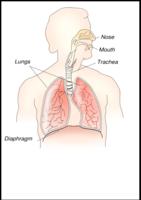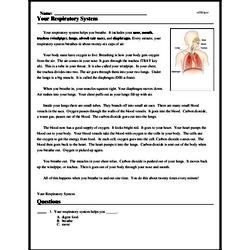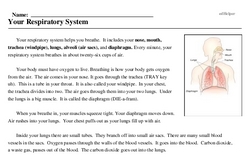Your Respiratory System
Your respiratory system helps you breathe. It includes your nose, mouth, trachea (windpipe), lungs, alveoli (air sacs), and diaphragm. Every minute, your respiratory system breathes in about twenty-six cups of air.
Your body must have oxygen to live. Breathing is how your body gets oxygen from the air. The air comes in your nose. It goes through the trachea (TRAY key uh). This is a tube in your throat. It is also called your windpipe. In your chest, the trachea divides into two. The air goes through them into your two lungs. Under the lungs is a big muscle. It is called the diaphragm (DIE-a-fram).
When you breathe in, your muscles squeeze tight. Your diaphragm moves down. Air rushes into your lungs. Your chest puffs out as your lungs fill up with air.




